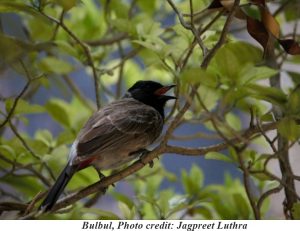Birds Look Agape at the Heat, But They are Airconditioning
The scorching summer sun, when ambient temperature is much higher than that, can be lethal to birds.
Birds with open beaks are a common sight in summer. They also breathe faster during the months of high heat. Both these are the birds’ way of fending off the stress caused by extreme temperatures. The heat tolerance threshold of most common birds is 40 degree Celsius. The scorching summer sun, when ambient temperature is much higher than that, can be lethal to birds.
Unlike humans and other mammals, birds do not have sweat glands, which offer the simplest way of cooling caused by evaporation. By keeping their beaks open during high summer, birds let the hot air outside sweep over the wet mucus membranes of the mouth and throat and, thereby, experience evaporative cooling. However, this also means the loss of water which can cause life-threatening dehydration among birds in extreme heat.

With an average normal body temperature of 40 degree Celsius, birds are three degrees Celsius hotter inside than humans; aslong as the ambient temperature is less than that, it would seem cool to them. Given the principle that heat flows from higher to lower temperatures, birds can simply dump the heat in the air under 40 degree Celsius. However, anything higher than that spells trouble for them.
Panting is another important way birds dissipate heat when the outside air goes beyond 40 degrees Celsius. The respiration rate of a house sparrow, for instance, goes up from 57/minute at 37 degree Celsius to 160/minute at 43 degree Celsius. Panting, while releasing heat, also causes rapid water loss or dehydration. According to the Proceedings of the National Academy of Sciences, USA, published online and quoted in Forbes on February 13, 2017, most animals can only tolerate water losses up to 15 or 20 percent of body mass before they die. Also, birds die faster due to heat stress than cold stress. So, a bird experiencing peak temperature during a hot summer day cannot survive for more than a couple of hours.
While open beaks are commonly understood as the birds’ way of dissipating the heat, scientific studies have also been done to find out if the beak is a thermoregulatory organ. An article by Dr. Julia Nowack in the Journal of Experimental Biology, UK, titled “Beating the Heat through the Beak”(2018-21, jeb169821doi.10.1242/jeb.169821), says that birds can alter blood flow to the bill according to the temperature of the surroundings.
“This means they can use the bill as a radiator to simply dump heat. The amount of heat from the sun increases the heatload on the bird while the external temperature and wind speed influence the potential for the bird to get rid of heat; in other words, the stiller and warmer the temperature, the less heat a bird can dissipate.”
Birds also lose heat through exposed skin, the reason why they hold their wings away from the body while resting, letting the hot air sweep away the heat. Light-coloured birds turn their lightest parts towards the sun on a hot day to reflect the heat. The other things birds do to beat the heat are exactly what we do: they drink more water, bathe/dip, rest in the shade, and avoid foraging and talking during the afternoon. So, they are smart; still, humans can make the summer easier for birds—at least in their backyards—by simply keeping bowls of clean water for them. (India Science Wire)
